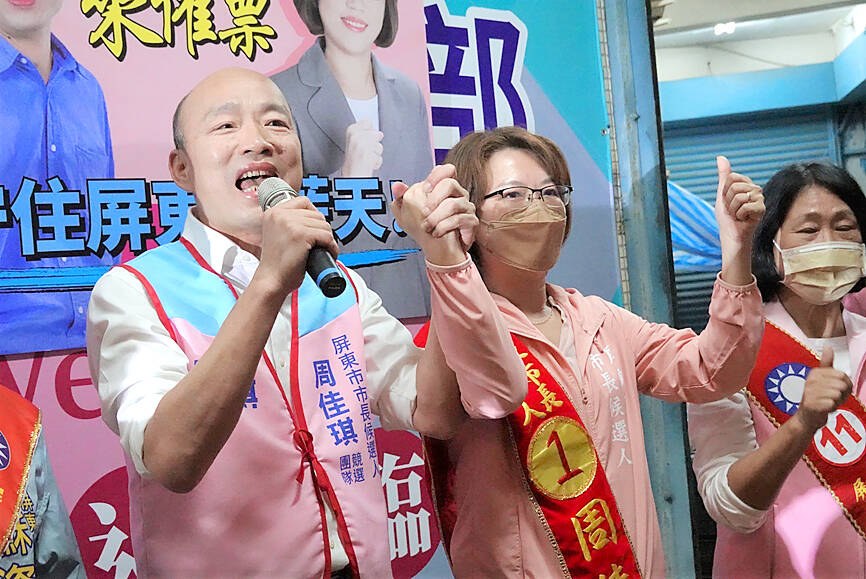Former Kaohsiung mayor Han Kuo-yu (韓國瑜) yesterday alleged that the Democratic Progressive Party (DPP) is using Taiwan Semiconductor Manufacturing Co (TSMC) as a means to secure votes for itself.
Han made the remarks in an interview on the Broadcasting Corp of China with network president Jaw Shaw-kang (趙少康).
Whenever the DPP faces the possibility of losing an election, it calls on TSMC to establish a plant in a county or city that is failing, Han said, adding that the chipmaker is like a “special branch” of the DPP similar to the Chinese Nationalist Party’s (KMT) relationship with the Huang Fu-hsing (黃復興) military veterans’ branch, whose members are considered party loyalists.

Photo: CNA
He also said that the DPP is “dismembering” TSMC.
Han said that young people are “waking up” and that the DPP is “treating the younger generation like fools.”
Future leaders are not blind to government corruption and the way county commissioners become billionaires at the end of their terms, he said.
Young people do not support authoritarianism and are not bound by tradition, Han said, citing the 72 Martyrs of Huanghuagang uprising in Guangzhou as an example of how young people are not afraid to risk fighting for change.
The 72 Martyrs launched the failed Second Guangzhou Uprising against the Qing Empire on April 27, 1911.
The DPP is aware of this change in attitude among young people, which is why the party has halted subsidies to help them travel back to their registered home town residences to vote, Han said.
The DPP is attempting to control the number of people who can vote by declaring that people who test positive for COVID-19 cannot enter polling stations.
Han said that military personnel — largely composed of young people carrying out mandatory service — are being affected by a DPP decision to rotate shifts on election day.
It is “preposterous” that military personnel cannot vote even when there is no threat of war, he added.
Jaw said during the interview that “voting for the DPP increases the risk of youth going into battle.”
Han responded by saying that those aged 18 to 24 are the primary casualties of war, and that peace must prevail.

CHANGING LANDSCAPE: Many of the part-time programs for educators were no longer needed, as many teachers obtain a graduate degree before joining the workforce, experts said Taiwanese universities this year canceled 86 programs, Ministry of Education data showed, with educators attributing the closures to the nation’s low birthrate as well as shifting trends. Fifty-three of the shuttered programs were part-time postgraduate degree programs, about 62 percent of the total, the most in the past five years, the data showed. National Taiwan Normal University (NTNU) discontinued the most part-time master’s programs, at 16: chemistry, life science, earth science, physics, fine arts, music, special education, health promotion and health education, educational psychology and counseling, education, design, Chinese as a second language, library and information sciences, mechatronics engineering, history, physical education

DEADLOCK: As the commission is unable to forum a quorum to review license renewal applications, the channel operators are not at fault and can air past their license date The National Communications Commission (NCC) yesterday said that the Public Television Service (PTS) and 36 other television and radio broadcasters could continue airing, despite the commission’s inability to meet a quorum to review their license renewal applications. The licenses of PTS and the other channels are set to expire between this month and June. The National Communications Commission Organization Act (國家通訊傳播委員會組織法) stipulates that the commission must meet the mandated quorum of four to hold a valid meeting. The seven-member commission currently has only three commissioners. “We have informed the channel operators of the progress we have made in reviewing their license renewal applications, and

The High Prosecutors’ Office yesterday withdrew an appeal against the acquittal of a former bank manager 22 years after his death, marking Taiwan’s first instance of prosecutors rendering posthumous justice to a wrongfully convicted defendant. Chu Ching-en (諸慶恩) — formerly a manager at the Taipei branch of BNP Paribas — was in 1999 accused by Weng Mao-chung (翁茂鍾), then-president of Chia Her Industrial Co, of forging a request for a fixed deposit of US$10 million by I-Hwa Industrial Co, a subsidiary of Chia Her, which was used as collateral. Chu was ruled not guilty in the first trial, but was found guilty

Taiwan People’s Party (TPP) Chairman Huang Kuo-chang (黃國昌) yesterday appealed to the authorities to release former Taipei mayor Ko Wen-je (柯文哲) from pretrial detention amid conflicting reports about his health. The TPP at a news conference on Thursday said that Ko should be released to a hospital for treatment, adding that he has blood in his urine and had spells of pain and nausea followed by vomiting over the past three months. Hsieh Yen-yau (謝炎堯), a retired professor of internal medicine and Ko’s former teacher, said that Ko’s symptoms aligned with gallstones, kidney inflammation and potentially dangerous heart conditions. Ko, charged with